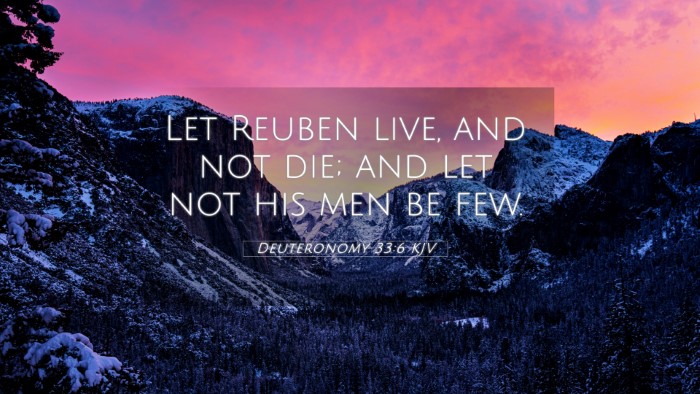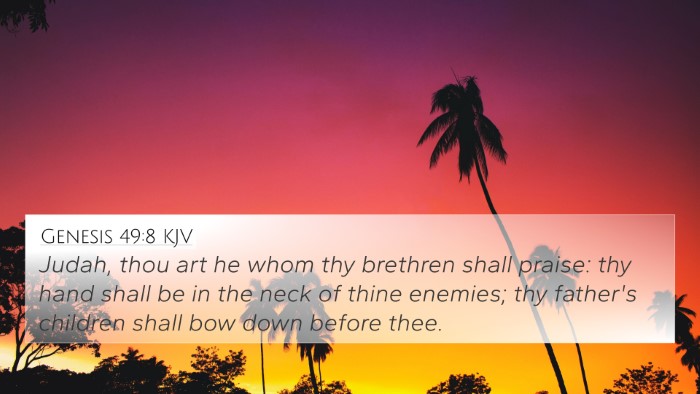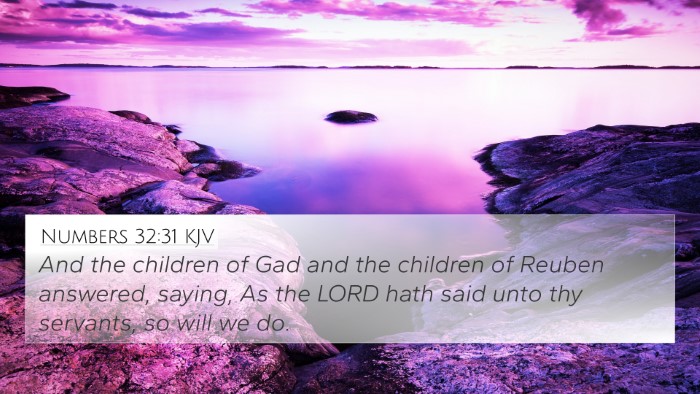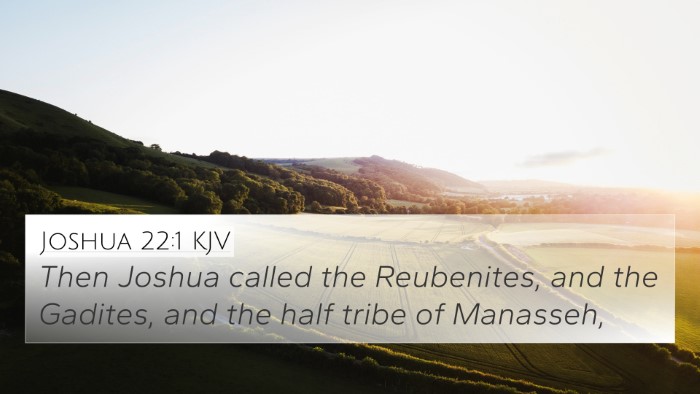Understanding Deuteronomy 33:6
Deuteronomy 33:6 states: "Let Reuben live, and not die; and let his men be few." This verse is a part of Moses' blessing to the tribes of Israel before his death. It addresses the tribe of Reuben specifically.
Commentary Insights
The verse emphasizes Moses' appeal for Reuben, the firstborn of Jacob, to thrive and not be diminished in number. Various public domain commentaries provide a rich understanding of this passage:
-
Matthew Henry:
Henry reflects on the historical shortcomings of the tribe of Reuben, highlighting their losses due to sin and instability. His prayer, "let Reuben live," is a plea for restoration and preservation amidst the tribe's weaknesses.
-
Albert Barnes:
Barnes discusses the implications of Reuben's character and behavior, noting that despite past conflicts, Moses seeks not their extinction but a future for them. This shows God's mercy and the importance of intercession through prayer.
-
Adam Clarke:
Clarke emphasizes the importance of blessing in biblical tradition. Moses acknowledges both the strength and the failings of Reuben, and his wish that "his men be few" indicates awareness of their challenges.
Connections to Other Bible Verses
In analyzing Deuteronomy 33:6, we can identify cross-references that provide thematic and interpretative depth:
- Genesis 49:3-4: This passage foreshadows Reuben's instability and conflict, sharing a direct connection with Moses' later blessings.
- Numbers 1:20-21: This discusses the census of Israel, indicating the numerical status of the tribe, which highlights their challenges in fulfillment of Moses' prayer.
- 1 Chronicles 5:1-2: These verses acknowledge Reuben's birthright but describe their loss of status, emphasizing the repercussions of their actions.
- Deuteronomy 28:15: Moses outlines the consequences of disobedience, relevant to understanding why Moses would invoke a lesser number of men for Reuben.
- Hebrews 11:21: This connects to the faith of Jacob, pointing towards the lineage and the importance of blessings within tribes.
- Lamentations 3:22-23: Corresponds with themes of mercy and hope, reinforcing the desired preservation for the tribe despite its past failings.
- Psalms 78:67-68: Refers to God's choice of Judah over Joseph and Reuben, highlighting the idea of leadership and blessing among the tribes.
- Matthew 1:3: References the genealogy of Christ, which includes the broader narrative of the tribes, connecting Reuben’s history to redemption through Jesus.
- Romans 9:4-5: Discusses the heritage of Israel which includes the blessings promised to the tribes, thus linking back to Reuben's future in the plan of God.
- James 1:17: A New Testament echo of the good gifts of God, resonating with Moses' desire for Reuben's prosperity.
Thematic Analysis
The overarching themes present in Deuteronomy 33:6 include:
- Divine Mercy: The verse emphasizes God's mercy towards Reuben, illustrating the redemptive nature of blessings even amidst a troubled history.
- Intercession: Moses' prayer is a clear act of intercession, demonstrating the importance of prayer for the people of God.
- Identity and Heritage: The historical context of Reuben's instability is a reminder of the importance of identity among the tribes of Israel.
- Leadership and Responsibility: Understanding the implications of being the firstborn and the responsibilities that come with it.
Conclusion
Deuteronomy 33:6 serves as a profound reminder of the complexities of blessing, lineage, and the grace of God extended towards His people. By exploring various commentaries and related scriptures, one can appreciate the richness of this verse and its significance in the broader narrative of the Bible.
Using Cross-References for Deeper Insights
The significance of cross-referencing biblical texts, such as Deuteronomy 33:6, allows for a deeper theological understanding and meaningful application in one's study of scripture. Tools for Bible cross-referencing, including concordances and study guides, can enhance one's ability to explore these connections thoroughly.






